Young people's attitudes and perceptions of technology-facilitated coercive control: A scoping review
IF 3.4
2区 心理学
Q1 CRIMINOLOGY & PENOLOGY
引用次数: 0
Abstract
Technology-facilitated coercive control (TFCC) refers to (ex-)partner abuse enabled by digital technology. While the role of technology in dating violence has been extensively studied, the understanding of young people's attitudes and perceptions of TFCC remains limited. Considering the role of technology in young people's lives and their increasing recognition as agents of change for the primary prevention of domestic violence and abuse (DVA), it is crucial to address this gap in the literature. This article draws on findings from a scoping review that examined the nature and extent of research conducted with young people exploring their attitudes towards and perceptions of TFCC. Sixteen articles met the inclusion criteria. Results from the review revealed that young people generally perceive TFCC behaviours as constituting DVA. However, attitudes vary based on the type of behaviour involved. Importantly, some young people identify contextual factors that distinguish non-abusive and abusive dynamics in intimate relationships. Inconsistent methodological approaches were found across studies, especially in quantitative research exploring a limited number of TFCC behaviours. The review considers implications for research and practice, emphasising the need to adopt an intersectional lens and a framework that prioritises contextual factors, including the gendered nature and impact of TFCC.
年轻人对技术促进的强制控制的态度和看法:范围审查
技术促进的强制控制(TFCC)是指由数字技术导致的(前)伴侣虐待。虽然科技在约会暴力中的作用已被广泛研究,但对年轻人对约会暴力的态度和看法的理解仍然有限。考虑到技术在年轻人生活中的作用,以及他们越来越被认为是家庭暴力和虐待初级预防变革的推动者,解决文献中的这一差距至关重要。本文借鉴了一项范围审查的结果,该审查审查了与年轻人进行的研究的性质和程度,探讨了他们对TFCC的态度和看法。16篇文章符合纳入标准。回顾的结果显示,年轻人普遍认为TFCC行为构成DVA。然而,态度因所涉及的行为类型而异。重要的是,一些年轻人发现了在亲密关系中区分非虐待和虐待行为的环境因素。在研究中发现了不一致的方法方法,特别是在探索有限数量的TFCC行为的定量研究中。该综述考虑了对研究和实践的影响,强调需要采用交叉视角和优先考虑情境因素的框架,包括TFCC的性别性质和影响。
本文章由计算机程序翻译,如有差异,请以英文原文为准。
求助全文
约1分钟内获得全文
求助全文
来源期刊

Aggression and Violent Behavior
Multiple-
CiteScore
7.50
自引率
4.30%
发文量
63
期刊介绍:
Aggression and Violent Behavior, A Review Journal is a multidisciplinary journal that publishes substantive and integrative reviews, as well as summary reports of innovative ongoing clinical research programs on a wide range of topics germane to the field of aggression and violent behavior. Papers encompass a large variety of issues, populations, and domains, including homicide (serial, spree, and mass murder: sexual homicide), sexual deviance and assault (rape, serial rape, child molestation, paraphilias), child and youth violence (firesetting, gang violence, juvenile sexual offending), family violence (child physical and sexual abuse, child neglect, incest, spouse and elder abuse), genetic predispositions, and the physiological basis of aggression.
 求助内容:
求助内容: 应助结果提醒方式:
应助结果提醒方式:


